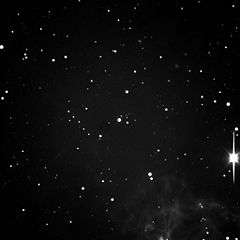17 Thetis
|
Star field showing asteroid Thetis in the center | |
| Discovery | |
|---|---|
| Discovered by | R. Luther |
| Discovery date | April 17, 1852 |
| Designations | |
| Pronunciation | /ˈθiːtᵻs/ THEE-tis |
Named after | Thetis |
|
A913 CA; A916 YF; 1954 SO1 | |
| Main belt | |
| Adjectives | Thetidian |
| Orbital characteristics[1] | |
| Epoch October 22, 2004 (JD 2453300.5) | |
| Aphelion | 419.069 Gm (2.801 AU) |
| Perihelion | 319.991 Gm (2.139 AU) |
| 369.530 Gm (2.470 AU) | |
| Eccentricity | 0.134 |
| 1418.027 d (3.88 a) | |
Average orbital speed | 18.87 km/s |
| 38.435° | |
| Inclination | 5.587° |
| 125.622° | |
| 135.906° | |
| Physical characteristics | |
| Dimensions | 90 ± 3.7 km (IRAS)[1] |
| Mass | 1.2×1018 kg[2][3] |
Mean density | 3.21 ± 0.92 g/cm³[2] |
| 0.0252 m/s² | |
| 0.0476 km/s | |
| 0.5113 d (12.27 h)[1][4] | |
| Albedo | 0.1715[1][5] |
| Temperature | ~173 K |
Spectral type | S[1] |
| 9.89 to 13.51[6] | |
| 7.76[1] | |
|
| |
17 Thetis is a large main-belt asteroid that was discovered by R. Luther on April 17, 1852. It was his first asteroid discovery. The name comes from Thetis, the mother of Achilles in Greek mythology.[7]
One Thetidian stellar occultation was observed from Oregon in 1999. However, the event was not timed.
The spectrum of this object indicates that it is an S-type asteroid with both low and high calcium forms of pyroxene on the surface, along with less than 20% olivine. The high-calcium form of pyroxene forms 40% or more of the total pyroxene present, indicating a history of igneous rock deposits. This suggests that the asteroid underwent differentiation by melting, creating a surface of basalt rock.[8]
Mass
The mass of Thetis has been calculated from perturbations by 4 Vesta and 11 Parthenope. In 2007, Baer and Chesley calculated Thetis to have a mass of 1.2×1018 kg[2][3] with a density of 3.21 g/cm³.[2]
References
- 1 2 3 4 5 6 "JPL Small-Body Database Browser: 17 Thetis" (2008-08-04 last obs). Retrieved 2008-11-12.
- 1 2 3 4 Baer, James; Steven R. Chesley (2007). "Astrometric masses of 21 asteroids, and an integrated asteroid ephemeris" (PDF). Celestial Mechanics and Dynamical Astronomy. Springer Science+Business Media B.V. 2007. 100 (2008): 27–42. Bibcode:2008CeMDA.100...27B. doi:10.1007/s10569-007-9103-8. Retrieved 2008-11-12.
- 1 2 (Mass of Thetis 0.00617 / Mass of Ceres 4.75) * Mass of Ceres 9.43E+20 = 1.224E+18
- ↑ "LIGHTCURVES AND MAP DATA ON NUMBERED ASTEROIDS N° 1 TO 52225". AstroSurf. Archived from the original on 2005-11-27. Retrieved 2008-11-03.
- ↑ "Asteroid Data Archive". Planetary Science Institute. Retrieved 2008-11-03.
- ↑ apmag 9.89 (1977-Jul-25) to 13.51 (1963-Aug-02) JPL Horizons daily output for 1950 to 2099
- ↑ Schmadel, Lutz D. (2003). Dictionary of minor planet names. 1 (5th ed.). Berlin Heidelberg New York: Springer-Verlag. p. 17. ISBN 3-540-00238-3.
- ↑ Sunshine, Jessica M.; et al. (August 2004), "High-calcium pyroxene as an indicator of igneous differentiation in asteroids and meteorites", Meteoritics & Planetary Science, 39 (8), pp. 1343–1357, Bibcode:2004M&PS...39.1343S, doi:10.1111/j.1945-5100.2004.tb00950.x.
External links
| Wikimedia Commons has media related to 17 Thetis. |
- JPL Ephemeris
- "Elements and Ephemeris for (17) Thetis". Minor Planet Center. (displays Elong from Sun and V mag for 2011)
- 2011-Apr-22 Occultation (Durech Model) / (2011 Asteroidal Occultation Results for North America)
- 17 Thetis at the JPL Small-Body Database

